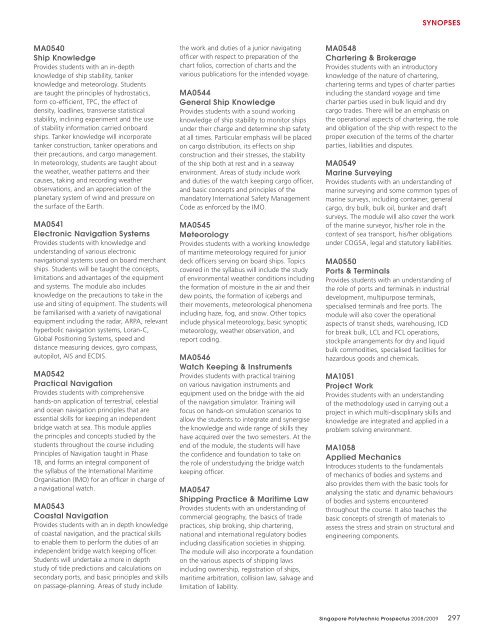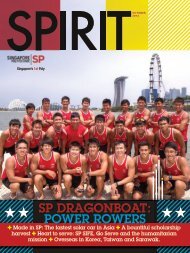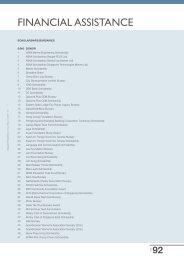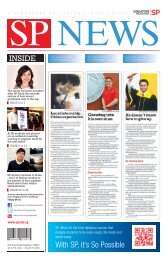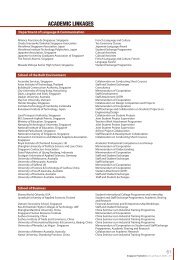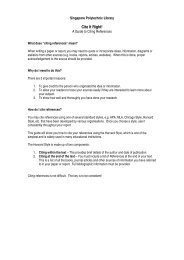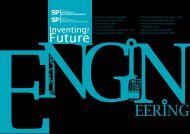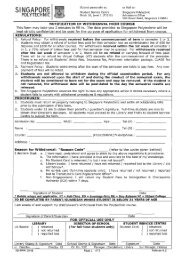SYNOPSES - Singapore Polytechnic
SYNOPSES - Singapore Polytechnic
SYNOPSES - Singapore Polytechnic
Create successful ePaper yourself
Turn your PDF publications into a flip-book with our unique Google optimized e-Paper software.
<strong>SYNOPSES</strong>MA0540Ship KnowledgeProvides students with an in-depthknowledge of ship stability, tankerknowledge and meteorology. Studentsare taught the principles of hydrostatics,form co-efficient, TPC, the effect ofdensity, loadlines, transverse statisticalstability, inclining experiment and the useof stability information carried onboardships. Tanker knowledge will incorporatetanker construction, tanker operations andtheir precautions, and cargo management.In meteorology, students are taught aboutthe weather, weather patterns and theircauses, taking and recording weatherobservations, and an appreciation of theplanetary system of wind and pressure onthe surface of the Earth.MA0541Electronic Navigation SystemsProvides students with knowledge andunderstanding of various electronicnavigational systems used on board merchantships. Students will be taught the concepts,limitations and advantages of the equipmentand systems. The module also includesknowledge on the precautions to take in theuse and siting of equipment. The students willbe familiarised with a variety of navigationalequipment including the radar, ARPA, relevanthyperbolic navigation systems, Loran-C,Global Positioning Systems, speed anddistance measuring devices, gyro compass,autopilot, AIS and ECDIS.MA0542Practical NavigationProvides students with comprehensivehands-on application of terrestrial, celestialand ocean navigation principles that areessential skills for keeping an independentbridge watch at sea. This module appliesthe principles and concepts studied by thestudents throughout the course includingPrinciples of Navigation taught in Phase1B, and forms an integral component ofthe syllabus of the International MaritimeOrganisation (IMO) for an officer in charge ofa navigational watch.MA0543Coastal NavigationProvides students with an in depth knowledgeof coastal navigation, and the practical skillsto enable them to perform the duties of anindependent bridge watch keeping officer.Students will undertake a more in depthstudy of tide predictions and calculations onsecondary ports, and basic principles and skillson passage-planning. Areas of study includethe work and duties of a junior navigatingofficer with respect to preparation of thechart folios, correction of charts and thevarious publications for the intended voyage.MA0544General Ship KnowledgeProvides students with a sound workingknowledge of ship stability to monitor shipsunder their charge and determine ship safetyat all times. Particular emphasis will be placedon cargo distribution, its effects on shipconstruction and their stresses, the stabilityof the ship both at rest and in a seawayenvironment. Areas of study include workand duties of the watch keeping cargo officer,and basic concepts and principles of themandatory International Safety ManagementCode as enforced by the IMO.MA0545MeteorologyProvides students with a working knowledgeof maritime meteorology required for juniordeck officers serving on board ships. Topicscovered in the syllabus will include the studyof environmental weather conditions includingthe formation of moisture in the air and theirdew points, the formation of icebergs andtheir movements, meteorological phenomenaincluding haze, fog, and snow. Other topicsinclude physical meteorology, basic synopticmeteorology, weather observation, andreport coding.MA0546Watch Keeping & InstrumentsProvides students with practical trainingon various navigation instruments andequipment used on the bridge with the aidof the navigation simulator. Training willfocus on hands-on simulation scenarios toallow the students to integrate and synergisethe knowledge and wide range of skills theyhave acquired over the two semesters. At theend of the module, the students will havethe confidence and foundation to take onthe role of understudying the bridge watchkeeping officer.MA0547Shipping Practice & Maritime LawProvides students with an understanding ofcommercial geography, the basics of tradepractices, ship broking, ship chartering,national and international regulatory bodiesincluding classification societies in shipping.The module will also incorporate a foundationon the various aspects of shipping lawsincluding ownership, registration of ships,maritime arbitration, collision law, salvage andlimitation of liability.MA0548Chartering & BrokerageProvides students with an introductoryknowledge of the nature of chartering,chartering terms and types of charter partiesincluding the standard voyage and timecharter parties used in bulk liquid and drycargo trades. There will be an emphasis onthe operational aspects of chartering, the roleand obligation of the ship with respect to theproper execution of the terms of the charterparties, liabilities and disputes.MA0549Marine SurveyingProvides students with an understanding ofmarine surveying and some common types ofmarine surveys, including container, generalcargo, dry bulk, bulk oil, bunker and draftsurveys. The module will also cover the workof the marine surveyor, his/her role in thecontext of sea transport, his/her obligationsunder COGSA, legal and statutory liabilities.MA0550Ports & TerminalsProvides students with an understanding ofthe role of ports and terminals in industrialdevelopment, multipurpose terminals,specialised terminals and free ports. Themodule will also cover the operationalaspects of transit sheds, warehousing, ICDfor break bulk, LCL and FCL operations,stockpile arrangements for dry and liquidbulk commodities, specialised facilities forhazardous goods and chemicals.MA1051Project WorkProvides students with an understandingof the methodology used in carrying out aproject in which multi-disciplinary skills andknowledge are integrated and applied in aproblem solving environment.MA1058Applied MechanicsIntroduces students to the fundamentalsof mechanics of bodies and systems andalso provides them with the basic tools foranalysing the static and dynamic behavioursof bodies and systems encounteredthroughout the course. It also teaches thebasic concepts of strength of materials toassess the stress and strain on structural andengineering components.<strong>Singapore</strong> <strong>Polytechnic</strong> Prospectus 2008/2009 297


